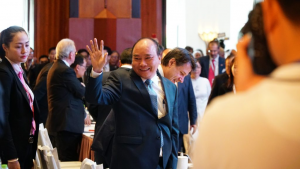By Prashanth Parameswaran
 On April 7, Vietnam provided a new round of assistance to five European nations. While the assistance was just the latest in a series of such initiatives, it nonetheless put the spotlight on Vietnam’s relations with key European countries during the global coronavirus pandemic.
On April 7, Vietnam provided a new round of assistance to five European nations. While the assistance was just the latest in a series of such initiatives, it nonetheless put the spotlight on Vietnam’s relations with key European countries during the global coronavirus pandemic.
As I have noted before in these pages, though Vietnam has long had ties with select European states, ties have gotten greater traction over the past few years, with a Partnership and Cooperation Agreement signed with the European Union in 2012 and relations with key individual countries including Britain, France, and Germany also being advanced in recent years.
Vietnam’s relations with European countries have not been untouched by COVID-19. On the one hand, ties have been negatively affected by the evolution of the global pandemic, with restrictions on exports and visa regulations affecting economic ties, which remain an important area for both sides. The virus also put on hold several of Vietnam’s diplomatic plans for 2020 as ASEAN chair and a nonpermanent member of the UN Security Council. But on the other hand, both sides have also been working to manage some of the fallout from COVID-19 as well, including sharing information where needed on the security of their citizens and continuing on with some key developments such as the final steps in ratifying the EU-Vietnam FTA, which, when approved by Vietnam’s legislature expected sometime next month, would go into effect over the summer.
This week, we saw an aspect of how both sides are managing ties amid the coronavirus with a public announcement of a round of Vietnam COVID-19-related assistance to European countries. Per Vietnam’s foreign ministry, Vietnam formally donated 550,000 face masks to five European countries on April 7 to support their fight against the coronavirus, with the masks, made of antimicrobial fabric, handed to the ambassadors of France, Germany, Italy, Spain, and the United Kingdom in Hanoi. In remarks during the handover ceremony in Hanoi, Vietnam’s Deputy Foreign Minister To Anh Dung said that the assistance spoke to the value of the strategic partnership between both sides as well as Vietnam’s recognition that “strengthening international cooperation and unity” is an important factor in minimizing the impact of COVID-19.
The development itself is in line with Vietnam’s broader diplomacy amid COVID-19 thus far, which has seen it make offers of assistance to other countries as well, including neighboring countries Cambodia and Laos as well as individual European countries such as Italy. But the aid is not without significance: it illustrates Hanoi’s continued willingness to assist other countries on a bilateral and multilateral basis to the best of its abilities even as it continues to remain vigilant about managing its own coronavirus challenge at home. Thus far, Vietnam has reported over 200 cases but no deaths, and it has taken additional measures including restrictions on movement and stepping up the production of masks.
To be sure, the round of assistance this week was just one manifestation of Vietnam’s multifaceted approach to contending with COVID-19 at home and abroad. Nonetheless, paying attention to these instances will continue to be important in assessing how the global pandemic is affecting Vietnam’s domestic and foreign policy.
No comments:
Post a Comment